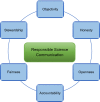Improving research integrity: a framework for responsible science communication
- PMID: 35570294
- PMCID: PMC9107633
- DOI: 10.1186/s13104-022-06065-5
Improving research integrity: a framework for responsible science communication
Abstract
Research integrity, an essential precept of scientific inquiry and discovery, comprises norms such as Rigor, Reproducibility, and Responsibility (the 3R's). Over the past decades, numerous issues have arisen that challenge the reliability of scientific studies, including irreproducibility crises, lack of good scientific principles, and erroneous communications, which have impacted the public's trust in science and its findings. Here, we highlight one important component of research integrity that is often overlooked in the discussion of proposals for improving research quality and promoting robust research; one that spans from the lab bench to the dissemination of scientific work: responsible science communication. We briefly outline the role of education and institutions of higher education in teaching the tenets of good scientific practice and within that, the importance of adequate communications training. In that context, we present our framework of responsible science communication that we live by and teach to our students in courses and workshops that are part of the Johns Hopkins Bloomberg School of Public Health R3 Center for Innovation in Science Education.
Keywords: Institutional graduate education programs; Research integrity; Responsibility; Rigor; Scientific communications training.
© 2022. The Author(s).
Conflict of interest statement
The authors declare no competing interests.
Figures
References
Publication types
MeSH terms
Grants and funding
LinkOut - more resources
Full Text Sources
Miscellaneous


